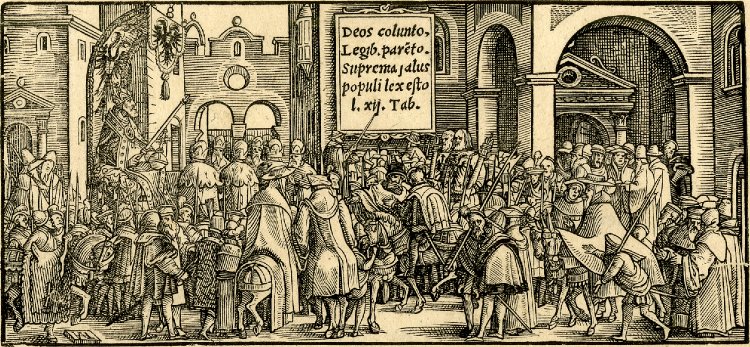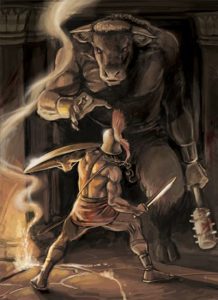In 1517, when the 95 Theses were first posted, Martin Luther had no intention of breaking from the Roman Catholic Church. Rather, he sought to reform the Church’s view on indulgences, believing that no one could buy their way into heaven. Believing that his view was deeply rooted in Scripture, he was confident that Church scholars would agree with him. Instead, the Church hierarchy responded by accusing Luther of heresy, wanting to quell any question of their authority. As a result, what was initially an effort to reform the Catholic faith eventually transformed into a major schism in Christianity itself.

Prior to sparking the Protestant movement, Martin Luther was an Augustinian monk teaching at the University of Wittenberg in Germany. In 1517, Pope Leo X sanctioned indulgences to be sold to raise money for the construction of St. Peter’s Basilica in Rome. An indulgence consisted of money given to the Church in exchange for less time in purgatory, which was conceived as a theological waiting room where imperfect souls were purified after death before they enter heaven. People essentially believed that this meant they could buy a way into heaven for themselves and their loved ones.1 As a result of the Pope’s decree, a Dominican monk, Johann Tetzel, began preaching in favor of these indulgences in the towns of Jüterbog and Zerbst near the university.2 Luther responded to this by writing to the archbishop, admonishing him by asserting that simply paying money to the Church does not purify the soul.
When his protestations went unanswered, Luther posted his 95 Theses. The theses were arguments opposing the manner in which indulgences were being sold.3 Most of the theses did not contradict Catholic doctrine, so it is widely believed that Luther wrote them to spark a theological academic debate. The theses, originally written in Latin, were translated into German and put into wide circulation; this caught the attention of Rome. Fearing that the funding for St. Peter’s Basilica was under threat, Leo ordered Luther to be investigated. In response, Luther sought the support of a Germanic prince, Frederick the Wise. Frederick granted Luther support and protection, insisting that the investigation take place in Germany.4 In response, Leo asked the papal legate in Augsburg, Cardinal Cajetan, to investigate Luther. Brought before Cajetan, Luther was asked to renounce his theses and recant his accusations against the Church. Luther refused, but agreed to stop commenting on indulgences and listen to the Church. Although this was not Cajetan’s desired result, Frederick allowed Luther to return to Wittenberg.5

The following year, 1519, Luther agreed to debate the theologian Johann Eck. Eck instigated the debate by comparing Luther’s positions to Jan Hus, a well-known heretic that had been excommunicated and executed a hundred years earlier. This forced Luther to declare that the Church had been wrong to condemn Hus, opening himself to charges of heresy.6 Eck had given the pope the opportunity to bring excommunication charges against Luther. However, the Holy Roman Emperor Charles V, not wanting to upset Frederick the Wise, forced the pope to subject Luther to a hearing at the Diet of Worms. At this time, Luther’s cause was gaining popularity among Germans. The emperor could not afford to upset the German prince, needing his support to fight an ongoing war with France and keep the Ottoman Empire from Austrian lands.7
During the trial, Luther was led into a room where his accusers had piled his works on a table, read the titles aloud, and asked if these books belonged to Luther. Luther replied that the books belonged to him. He was then asked to renounce them. Luther then asked for time to consider. When he returned the next day he refused to reject anything, saying that unless he was disproved by Scripture, he was bound by his conscience to defend his work.8 He felt that he was strongly supported by the Bible. However, Church officials saw this as a rejection of their authority rather than an appeal to Scripture. Charles V, though angered, could do nothing to condemn Luther as long as he remained at war. Instead, he planned to send Luther back to Wittenberg marked as a heretic.9 However, before he reached the university, Frederick the Wise secretly had Luther taken to Wartburg Castle.10
Throughout the next few years, Luther continued to defend his works. One of his biggest achievement during this time was the translation of the Bible from Latin into German. Still, he was forced to remain hidden. Charles V, after securing an alliance with the pope in the war against France, no longer needed ties with Frederick the Wise. This allowed the papal bull, proclaiming Luther’s excommunication, to be issued, adding a decree which ordered that no one give Luther refuge.11 It was ultimately his refusal to retract his works that prevented Luther from reforming the Church. Pope Leo X, Charles V, and other high Church officials perceived Luther’s passion for reform as a challenge to authority. In contrast, Luther believed that his works were strongly supported in Scripture. The miscommunication and stubbornness of both parties ultimately led to a major schism within Christianity. When the Church labeled him a heretic, Luther had no choice but to begin his own branch of Christianity, Lutheranism, so that he could continue to practice the faith to which he had dedicated his life.
- Renaissance and Reformation Reference Library, July 2002, s.v. “Martin Luther: Founder of Lutheranism” edited by Julie L. Carnegie. ↵
- New Catholic Encyclopedia, September 2003, s.v. “Luther, Martin” by Bill Ditewig. ↵
- Funk and Wagnalls New World Encyclopedia, 2016, s.v. “Luther, Martin” ↵
- Renaissance and Reformation Reference Library, July 2002, s.v. “Martin Luther: Founder of Lutheranism” edited by Julie L. Carnegie. ↵
- New Catholic Encyclopedia, September 2003, s.v. “Luther, Martin” by Bill Ditewig. ↵
- Renaissance and Reformation Reference Library, July 2002, s.v. “Martin Luther: Founder of Lutheranism” edited by Julie L. Carnegie. ↵
- Renaissance and Reformation Reference Library, July 2002, s.v. “Martin Luther: Founder of Lutheranism” edited by Julie L. Carnegie. ↵
- Encyclopedia of World Biography, December 2004, s.v. “Martin Luther,” by Andrea Henderson. ↵
- Julius Koestlin, Life of Luther (Project Gutenberg Literary Archive Foundation, 2006), 105-116. ↵
- Funk and Wagnalls New World Encyclopedia, 2016, s.v. “Luther, Martin” ↵
- Julius Koestlin, Life of Luther (Project Gutenberg Literary Archive Foundation, 2006), 105-116. ↵



94 comments
Alondra Lozano
I recently learned about Martin Luther and this article really went into detail to explain more. Martin Luther was a wise man and knew that what the catholic church was doing was wrong. This was an interesting article because Luther was able to translate the Bible into another language and show the face of how the catholic church would take advantage of the people.
Nathaniel Bielawski
Luther’s treatment by catholic church officials demonstrates the importance of separation between church and state. I think Luther is lucky to be alive after being captured and deemed a heretic. If Frederick the Wise hadn’t been at war, Luther would have likely been executed, ending any chance of Protestantism from forming.
Sara Guerrero
I’ve recently learned about Martin Luther but he definitely changed the perspective of the Catholic church and heaven. People were definitely taken advantage of and Martin Luther did the right job in informing the people that you can’t buy your way into heaven. I think this publication did a great job in detailing how Luther’s passion for reform helped change the way religion was practiced.
Giselle Garcia
Martin Luther was very courageous to stick to his beliefs even though the Church told him to deny them. Luther posted his 95 Theses because he believed the Church’s selling of indulgences was wrong, and he wanted to address this issue particularly. It was interesting to read that the Church sold indulgences for the building of a St. Peter’s Basilica in Rome. In the end, Luther was declared a heretic, and he went off on his own, creating his own branch of Christianity, Lutheranism.
Lesley Martinez
This is a well-written article. Martin Luther’s courage to speak out about his beliefs on indulgences is mind-blowing. It’s a strange phenomenon that the Roman Catholic Church authorized indulgences and claimed that it would lead people to heaven. To be able to speed up the process of purgatory and wait in a “theological waiting room” sounds outrageous. His 95 Theses caused lots of debate and even had him renounce it, yet that did not stop him as he made his own branch of Christianity, Lutheranism. He was adamant that he was following Scripture and felt strongly about his work. Great article!
Hailey Rodriguez
This article was very well written and was really interesting. I had heard of Martin Luther and how he created a separation of the Catholic Church however, I did not know why he did so and what exactly he was protesting. I also did not know that the Church was claiming that by paying money to the Church you could basically buy your way into Heaven. Based on it makes total sense why Luther would protest agaisnt this.
Hali Garcia
This is a great article! What Martin Luther did was very brave on his part because he was challenging the authority. His theses were very well written and argued. What struck me was how he never backed down from his views even when they could have gotten him killed. It is interesting to hear how the Church was selling indulgences to help fund the building of a new Basilica in Rome.
Zachary Kobs
What an incredible thing Martin had done by going against the Church and with such well-written theses. It is one thing to believe in something but it is another thing to have the courage to stand up for it against the opposition. I agree with Martin completely as indulgences were not right because in no form can you buy your way into heaven.
Samuel Vega
Martin Luther has a interesting background. He was a Scripture scholar who stood by his principles even when he was challenged and threatened by the Catholic Church. His disagreement with the Church was based on the Church allowing indulgences so one could be allowed into heaven. Luther posted his disagreements in the 95 Theses. This work became the foundation for Lutheranism. Teresa’s gives a concise explanation of Martin Luther and his beliefs.
Antonio Holverstott
Martin Luther was a man who feared the Lord very well and studied the Scriptures avidly. Before he became a monk, he was studying to be a lawyer. However, that all changed when he was riding somewhere in the middle of the night during a storm. The storm was so severe, Luther took it as a sign from God to become a monk for the Catholic Church. During this time as a monk, he looked in the Word of God and his whole view of how Christianity worked changed. He wanted everyone to know this out of zeal he had for the Lord and love for everyone, especially those who paid indulgences.